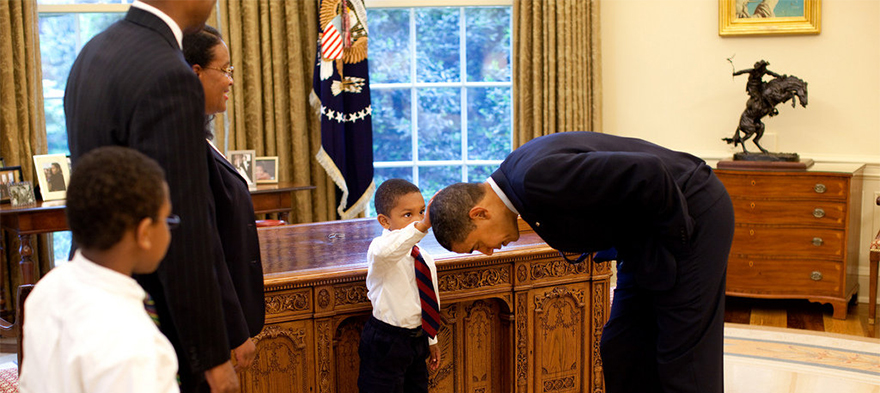
Nov 15, 2016 12:00:00 AM
'I want to know if my hair is just like yours,' he told Mr. Obama, so quietly that the president asked him to speak again. Jacob did, and Mr. Obama replied, 'Why don’t you touch it and see for yourself?' He lowered his head, level with Jacob, who hesitated. 'Touch it, dude!' Mr. Obama said. As Jacob patted the presidential crown, Mr. Souza snapped. 'So, what do you think?' Mr. Obama asked. 'Yes, it does feel the same,' Jacob said.My hair, President Obama did not have to say, is just like yours, Jacob. One day, the Oval Office could be yours, too. The gesture of stooping his tall frame to meet this small child where he was at was quietly moving. Epic in its humility. Over the span of eight years, millions of children, especially Black children, saw a president who looked like them, fought for them, played with them, and cared for them. They saw the father of two daughters who have grown into beautiful, poised young women, the older of whom was accepted to Harvard. They saw the loving husband of a lioness who spoke out against the misogyny of Donald Trump, voice quavering throughout, as she said:
We’re telling our sons that it’s O.K. to humiliate women. We’re telling our daughters that this is how they deserve to be treated. We’re telling all our kids that bigotry and bullying are perfectly acceptable in the leader of their country.They saw [pullquote position="right"]a President who made it a point to celebrate children[/pullquote], be it through hosting princess parties for little Black girls to promote literacy and positive self-image or talking to children from all over the world, children of all different colors, creeds, and costumes. He seemed equally delighted to meet a young Muslim girl refugee as he did the son of British royalty. Whether he was playing with babies dressed as elephants or running around the White House lawn, President Obama was his most genuine self with children. When these children become older and see these pictures of themselves with this remarkable man, they’ll remember a president who was dignified and gracious enough to shake hands with someone who had the cruelty to question whether he was born in America. They’ll remember someone who said of an unarmed teenager, dismissed as a thug in a hoodie, who was shot dead by a vigilante: “You know, if I had a son, he’d look like Trayvon.” They’ll remember a champion of people who finally became visible and heard during his presidency—Blacks, Latinos, Muslims, immigrants, gay people, women, and of course, the youngest Americans whose futures remain unwritten, waiting for them to grab pens and start writing them as how they envision them to be. I will miss you, President Barack Hussein Obama.
Caroline Bermudez is chief storyteller at the Charter School Growth Fund and former senior writer at Education Post. Bermudez has been a journalist for almost 10 years. She was staff editor at The Chronicle of Philanthropy, covering the nonprofit world, with a particular focus on foundations and high net-worth giving. She has interviewed prominent business, political and philanthropic leaders including Colin Powell, Ronald Perelman, Carl Icahn, Patty Stonesifer and Eli Broad. She also assisted with The Chronicle's Philanthropy 50, its annual ranking of America's most generous donors. A proud graduate of Chicago Public Schools, she has a B.A. in history from Swarthmore College.
The story you tell yourself about your own math ability tends to become true. This isn’t some Oprah aphorism about attracting what you want from the universe. Well, I guess it kind of is, but...
If you have a child with disabilities, you’re not alone: According to the latest data, over 7 million American schoolchildren — 14% of all students ages 3-21 — are classified as eligible for special...
The fight for educational equity has never been just about schools. The real North Star for this work is providing opportunities for each child to thrive into adulthood. This means that our advocacy...
Your donations support the voices who challenge decision makers to provide the learning opportunities all children need to thrive.
Ed Post is the flagship website platform of brightbeam, a 501(c3) network of education activists and influencers demanding a better education and a brighter future for every child.
© 2020–2024 brightbeam. All rights reserved.
Leave a Comment